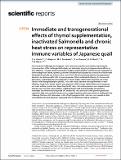Files in this item
Immediate and transgenerational effects of thymol supplementation, inactivated Salmonella and chronic heat stress on representative immune variables of Japanese quail
Item metadata
| dc.contributor.author | Videla, E. A. | |
| dc.contributor.author | Giayetto, O. | |
| dc.contributor.author | Fernández, M. E. | |
| dc.contributor.author | Chacana, P. A. | |
| dc.contributor.author | Marín, R. H. | |
| dc.contributor.author | Nazar, F. N. | |
| dc.date.accessioned | 2020-11-13T15:30:08Z | |
| dc.date.available | 2020-11-13T15:30:08Z | |
| dc.date.issued | 2020-10-23 | |
| dc.identifier | 271203349 | |
| dc.identifier | aee14c29-3903-4dab-a985-9eadc0d10020 | |
| dc.identifier | 85093653401 | |
| dc.identifier | 33097768 | |
| dc.identifier | 000586485700010 | |
| dc.identifier.citation | Videla , E A , Giayetto , O , Fernández , M E , Chacana , P A , Marín , R H & Nazar , F N 2020 , ' Immediate and transgenerational effects of thymol supplementation, inactivated Salmonella and chronic heat stress on representative immune variables of Japanese quail ' , Scientific Reports , vol. 10 , 18152 . https://doi.org/10.1038/s41598-020-74547-2 | en |
| dc.identifier.issn | 2045-2322 | |
| dc.identifier.uri | https://hdl.handle.net/10023/20970 | |
| dc.description | E.A.V. holds a research fellowship from Fondo para la Investigación Científica y Tecnológica (FonCyT-Project 2014-2764). This research was supported by grants from FonCyT (Projects 2016-1969 and 2018-2781) and Secretaría de Ciencia y Técnica, Universidad Nacional de Córdoba (SECyT-UNC, Project 30820150100031CB). | en |
| dc.description.abstract | Environmental challenges are integrated in the inmunoneuroendocrine interplay, impacting the immune system of the challenged individuals, and potentially implying transgenerational effects on their offspring. This study addressed whether dietary supplementation with thymol can modulate the immune response of adult Japanese quail when simultaneously exposed to an inoculum of inactivated Salmonella Enteritidis and a chronic heat stress (CHS). We also evaluated whether the experienced situations by adults can affect the immune response of their undisturbed offspring. In the parental generation, supplemented quail exposed to CHS had a higher inflammatory response and similar values of the heterophil/lymphocyte (H/L) ratio than those that were not supplemented. In their offspring, those chicks whose parents were exposed to CHS showed higher inflammatory response and lower antibody production. Regarding the H/L ratio, chicks whose parents were supplemented showed lower H/L ratio values. Dietary supplementation with thymol partially and positively modulated the inflammatory response and avoided H/L ratio alteration in the parental generation exposed to high environmental temperatures, suggesting these adults were better at dealing with the challenge. The lower H/L ratio values in the offspring suggests that chicks are more capable to deal with potential stressful situations associated with conventional breeding conditions. | |
| dc.format.extent | 11 | |
| dc.format.extent | 1387342 | |
| dc.language.iso | eng | |
| dc.relation.ispartof | Scientific Reports | en |
| dc.subject | Animal physiology | en |
| dc.subject | Immunology | en |
| dc.subject | QL Zoology | en |
| dc.subject | QR180 Immunology | en |
| dc.subject | General | en |
| dc.subject | NDAS | en |
| dc.subject.lcc | QL | en |
| dc.subject.lcc | QR180 | en |
| dc.title | Immediate and transgenerational effects of thymol supplementation, inactivated Salmonella and chronic heat stress on representative immune variables of Japanese quail | en |
| dc.type | Journal article | en |
| dc.contributor.institution | University of St Andrews. School of Biology | en |
| dc.identifier.doi | 10.1038/s41598-020-74547-2 | |
| dc.description.status | Peer reviewed | en |
This item appears in the following Collection(s)
Items in the St Andrews Research Repository are protected by copyright, with all rights reserved, unless otherwise indicated.

